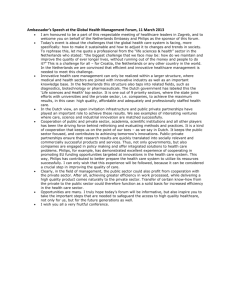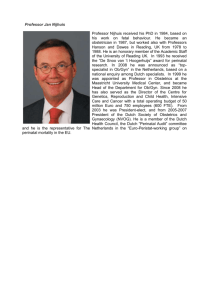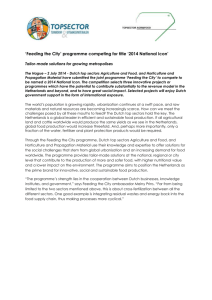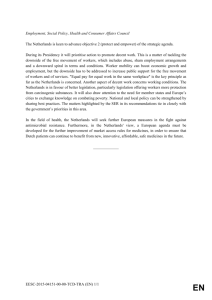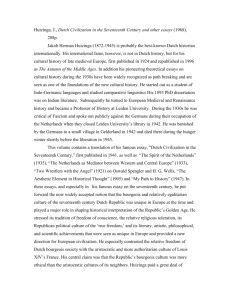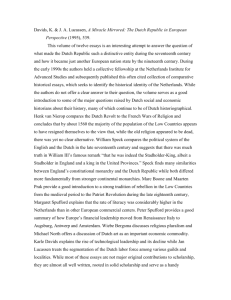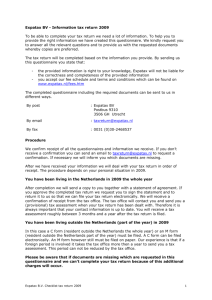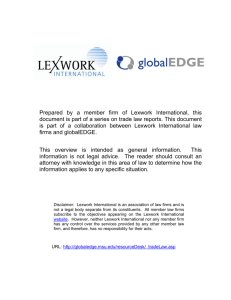DOC - Europa
advertisement
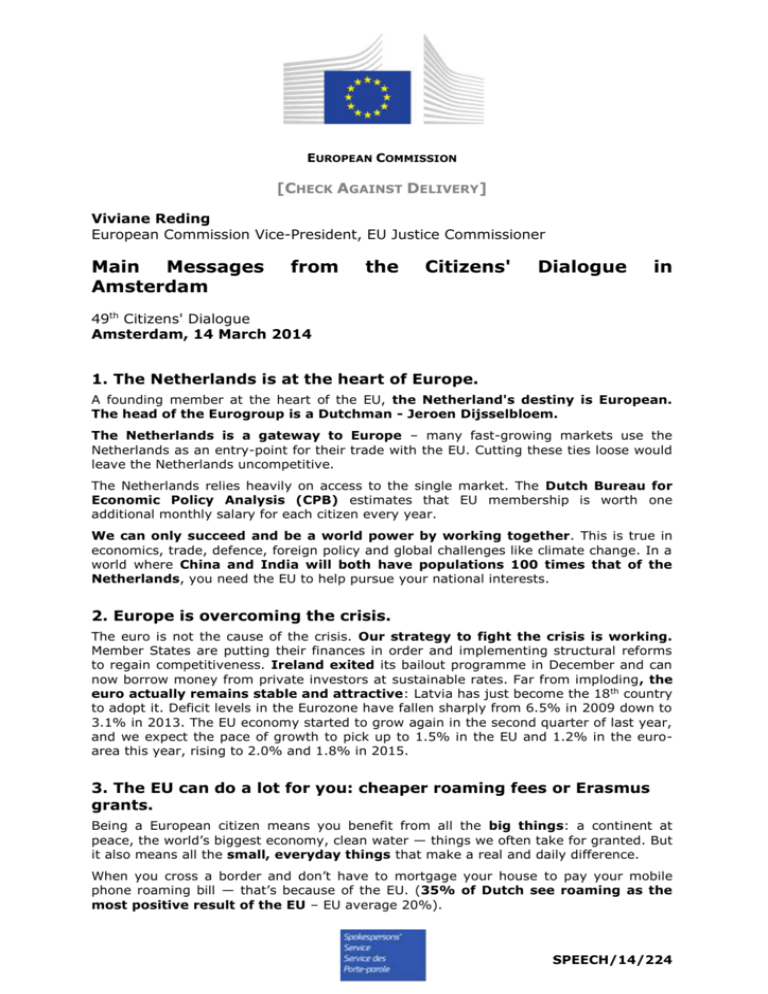
EUROPEAN COMMISSION [CHECK AGAINST DELIVERY] Viviane Reding European Commission Vice-President, EU Justice Commissioner Main Messages Amsterdam from the Citizens' Dialogue in 49th Citizens' Dialogue Amsterdam, 14 March 2014 1. The Netherlands is at the heart of Europe. A founding member at the heart of the EU, the Netherland's destiny is European. The head of the Eurogroup is a Dutchman - Jeroen Dijsselbloem. The Netherlands is a gateway to Europe – many fast-growing markets use the Netherlands as an entry-point for their trade with the EU. Cutting these ties loose would leave the Netherlands uncompetitive. The Netherlands relies heavily on access to the single market. The Dutch Bureau for Economic Policy Analysis (CPB) estimates that EU membership is worth one additional monthly salary for each citizen every year. We can only succeed and be a world power by working together. This is true in economics, trade, defence, foreign policy and global challenges like climate change. In a world where China and India will both have populations 100 times that of the Netherlands, you need the EU to help pursue your national interests. 2. Europe is overcoming the crisis. The euro is not the cause of the crisis. Our strategy to fight the crisis is working. Member States are putting their finances in order and implementing structural reforms to regain competitiveness. Ireland exited its bailout programme in December and can now borrow money from private investors at sustainable rates. Far from imploding, the euro actually remains stable and attractive: Latvia has just become the 18th country to adopt it. Deficit levels in the Eurozone have fallen sharply from 6.5% in 2009 down to 3.1% in 2013. The EU economy started to grow again in the second quarter of last year, and we expect the pace of growth to pick up to 1.5% in the EU and 1.2% in the euroarea this year, rising to 2.0% and 1.8% in 2015. 3. The EU can do a lot for you: cheaper roaming fees or Erasmus grants. Being a European citizen means you benefit from all the big things: a continent at peace, the world’s biggest economy, clean water — things we often take for granted. But it also means all the small, everyday things that make a real and daily difference. When you cross a border and don’t have to mortgage your house to pay your mobile phone roaming bill — that’s because of the EU. (35% of Dutch see roaming as the most positive result of the EU – EU average 20%). SPEECH/14/224 When you buy a new laptop, TV, or other item from your local high street store and are automatically given a two-year warranty — that’s because of the EU. When you or your child is given the opportunity to study abroad with your fees paid — that’s because of the EU. Citizenship of the Union gives all citizens the same rights regardless of their nationality. This comes in addition to our national and cultural identities — it’s an added bonus. It does not replace but complements. It means that you can cross borders in the EU and be confident you will be able to benefit from the same rights you get back home. 4. You cannot have the single market without the free movement of people In polls, 64% of the Dutch see free movement as the most positive thing to come out of the EU (compared to 57% of all EU citizens on average). Free movement is a two-way street from which all Member States benefit. This was one of the reasons why all Member States unanimously agreed to successive EU enlargements. The Netherlands is among the top ten EU countries that most rely on the right to free movement with half a million Dutch citizens going to other EU countries every year. In 2011, the Netherlands exported almost 4 times more to the other European Union countries than in 1990. The enlargements of the EU were a tremendous boost to Dutch exports to the rest of the Union. In 1995, a few years after the fall of the Berlin Wall, Dutch exports amounted to only 2.9 billion euro, but now they amount to a massive 26 billion euro. This is the single market: Four fundamental freedoms. You cannot separate one from the other. You cannot have free movement of services and capital, but not of persons. This is the spirit of the EU Treaties. And the European Commission is the Guardian of those very Treaties. That is why the Commission rigorously enforces EU rules on free movement. It is our duty and we will not shy away from it. 5. The EU is democratic. In polls only 32% of the Dutch knew MEPs were directly elected by them (EU average 47%). The European Parliament is a powerful parliament. There are 751 deputies to elect to the European Parliament in May, 26 of them from the Netherlands. Together with the governments of the 28 Member States, they have a say on practically every law passed at EU level - the vast majority of EU laws are co-decided by the European Parliament. They decide on rules for banks, health and the environment – rules that affect Europe's 507 million citizens. EU laws are made by the directly elected members of the European Parliament and by national governments. Elected national parliaments, including the Tweede Kamer, also have more influence than ever before over European decision-making. Of course you can always do better. In my view for example, all EU Commissioners should be elected. I would also like to see the President of the European Commission be elected by the majority in the European Parliament. Because the Commission is a political body. First and foremost, I would like to see a high turnout – 50% or more - at the European elections in May. Elections are determined by the people who show up. 2 6. The EU acts where Member States cannot do it alone. The EU is the right level to jointly tackle major cross-border issues such as climate change, the environment, and our common response to the financial and economic crisis. For example, a lack of regulation in the banking sector is widely recognised to have contributed to the financial crisis. As a result, the EU has now adopted important new laws to curb risky practices, lower excessive pay and help restore financial stability. Brussels is often blamed. Example of olive oil cans: It was in fact the olive-oil exporting countries who asked us to regulate this very specific technical aspect. Example of hairdressers' high heels – same story. It is salon owners and hairdressers themselves who asked us to look at a mixture of rules and non-binding guidance for the industry. We decided to reject both of these and as a result we are getting blamed by some for not regulating! 74% of Europeans think the EU generates too much bureaucracy – when in fact most bureaucracy originates in the Member States themselves when they translate a European law with 10 Article into a 100 pages legislative text. When the EU tries to cut red tape in the Member States, we see resistance. 7. Data Protection is made in Europe A common data protection framework would bolster the digital economy, and help national companies to go European. Opening our internal market of 507 million consumers to SMEs thanks with one law for one continent will help the small become big. Just like the Amsterdam-born TomTom company making SatNavs – we need more European tech-giants. The next Google should be European. Data protection is made in Europe. Strong data protection rules must be Europe’s trade mark. This week the European Parliament sent an unequivocal message in giving its strong backing to the Commission’s proposals: the reform is necessary and now it is irreversible. EU leaders agreed at their summit in October to adopt the reform in a timely way. Now it is time national ministers followed through. 8. The EU is making women's rights a reality After 5 decades of EU action, gender equality is a European achievement. Europe has been promoting gender equality since 1957. We have developed laws guaranteeing equal pay for equal work, equality in the workplace and minimum rights to maternity leave. Thanks to EU laws, women no longer have to face discrimination because of their sex. 60% of new university graduates across the EU today are female. And in spite of the recent economic crisis, the employment rate for women across the EU is at 63%, up from 55% in 1997, which is only 2 percentage points lower than the U.S. and Japan! 3

